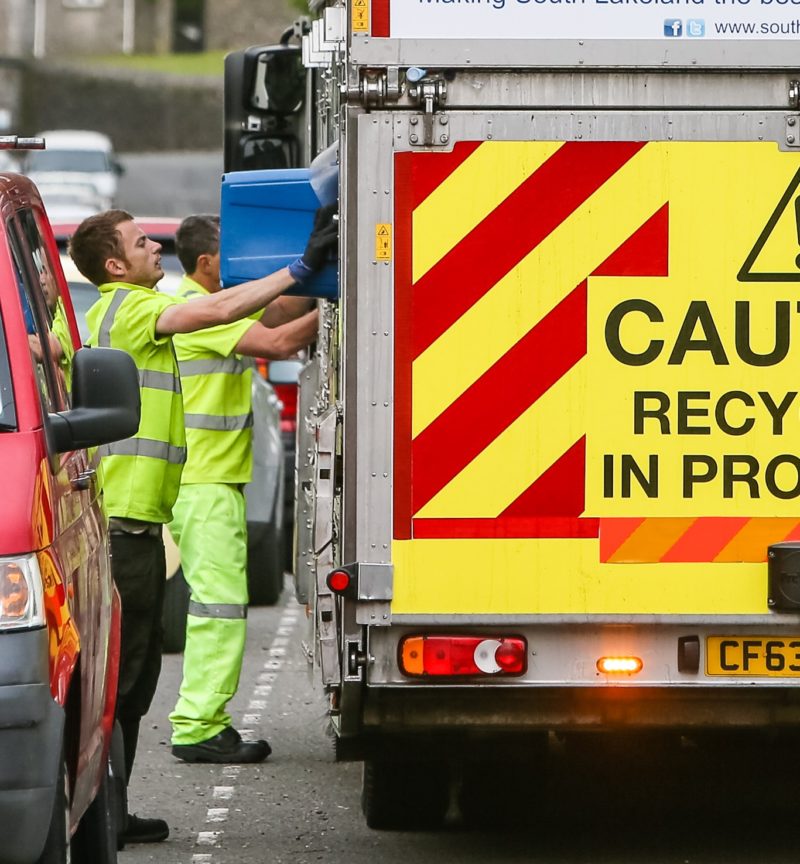Councils have been advised to stop using boxes or bags to collect recyclable materials from the kerbside – in order to reduce the risk of injuries to collection crews.
The advice follows a joint study by Glasgow Caledonian University and the University of Greenwich, which suggested that separate waste containers such as bags or boxes may cause “long-term musculoskeletal disorders” to collection workers.

Academics from two universities have advocated the use of wheelie bins over recycling boxes and bags
The study used a GCU-developed body-mapping method to study the effects of lifting various types of waste containers by workers across a four-year period in an unnamed local authority.
Health problems
Glasgow Caledonian University’s Professor Bill Hare, who headed the GCU team during the study, warned that recycling bags and boxes put out with household and business waste could lead to an increase in health problems for refuse collectors.
Researchers used an ‘Average Pain Count’ to examine lower back, shoulder, neck and upper spine complaints developed by refuse workers collecting either wheeled bins, waste sacks, or recycling bags or boxes.
The researchers suggested that wheeled bins were the least likely to cause pain whereas boxes represented the highest risk. The academics called for boxes to be discontinued by local authorities to protect the long-term health of workers “as a matter of urgency”, particularly with an ageing workforce.
Professor Hare said: “If we want our refuse workers to work more productively for longer, and with fewer health problems, then the use of wheeled bins is an essential starting point.
“If we want our refuse workers to work more productively for longer, and with fewer health problems, then the use of wheeled bins is an essential starting point.”
Billy Hare
Glasgow Caledonian University
“The negative health effects of using sacks, baskets and boxes for waste collection have been known for some time now, but the research up until this point has been purely lab-based, which some find difficult to relate to their day-to-day work. This study has used real-life field data for the first time, to dispel any doubts held by local authorities over the benefits of using wheeled bins.”
Discussion
The merits of collecting recyclable waste using wheeled bins or separate bags or boxes has long been debated in the waste and recycling sector, and there is continuing discussion over which collection method should be favoured option by local authorities and waste management companies.
Advocates of separate recycling collections, potentially involving multiple boxes or bags, suggest that this can be preferable for producing a better quality of recyclable material from households.
But, a ‘commingled’ system, which usually involves collecting material mixed together in a wheeled bin or bag, is seen as being easier for householders to grasp – albeit at the cost of potentially attracting a greater level of contamination.
However, for separate food waste collection – which is likely to be pushed by government through its Resources and Waste Strategy – there are fewer options for those seeking to collect the material separately, with caddy collections representing the most viable option for most.
Results
The results of the health research were published by the journal Policy and Practice in Health and Safety, from the Institution of Occupational Safety and Health (IOSH).
Using the example of the local authority case study, the research suggested that measures of MSD-related pain declined “significantly” after the introduction of wheeled bins in 2013 compared to the previous year. However, the study also reported an increase in 2014 when the authority introduced additional sacks, bags and baskets for garden, food and other waste.
Lower back pain was caused as a result of “bending, twisting, lifting and sorting recycling into different components and bins” the study found. Greater job rotation among workers on the various tasks also helped prevent higher rates of MSDs.
Commenting on the issue, Andy Robertson, environmental & waste management group chair at IOSH, said: “Figures released by the Health and Safety Executive (HSE) show around 70% of all workers in the Waste Management industry are involved in municipal household and commercial collections.
“These collections account for about 80% of all the reported injuries, with the most common being musculoskeletal disorders.”
South Lakes
Earlier this month, South Lakeland district council announced it would be switching to smaller recycling boxes to reduce the “potential risk” of injury to council staff and householders (see letsrecycle.com story).
According to the authority, the move took into account a study from HSE dating back to 2006 showing “clear evidence associated with the risk factors of the weight and frequency of manual handling of 55-litre boxes”.
The post Councils told to favour wheeled bins due to injury risk appeared first on letsrecycle.com.
Source: letsrecycle.com Waste Managment




